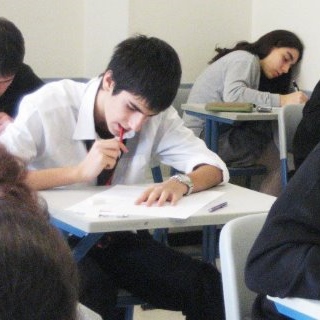click to dowload our latest edition
CLICK HERE TO SUBSCRIBE TO OUR NEWSLETTER


Published
4 years agoon
By
adminTALI FEINBERG
Should we hover and help, or stay away? Should we cancel all outings and extra-murals, or encourage breaks and exercise? How do we know that our children are studying enough, and how can we tell if the pressure is getting to them?
Cape Town based parenting coach Laura Markovitz says that at the outset, it’s important for parents to manage their own association with exams so that they don’t project it onto their children.
“Exams may have been incredibly stressful or really easy for them, but they need to remember that their children need to find their own away around exams. Parents, as much as they want to, can’t control their children’s study habits,” says Markovitz.
“Different children study differently, and each child may require varying levels of support from parents. It’s important for parents to try to dance the difficult dance of helping to motivate kids but not completely stress them out. There are such high levels of anxiety in children and teenagers today, so it’s important to keep things in perspective” she says.
“Our role can be facilitative rather than controlling and interfering.
“Help children plan how they are going to study – when, where, and how long. Let them be part of working this out, so that parents are not dictating the plan. Make sure that it’s not all about studying during exam time.
“Most importantly, ensure that they get enough sleep, that they are exercising and eating well. Stay connected to them; remember to empathise when they are having a tough time,” she says.
“If exams go well or badly, make time to reflect on what worked and what didn’t so that they can learn for next time. This can give them space to self-evaluate, and learn how they are learning. If we come down hard and criticise them, they are more like to shut us off or get defensive,” says Markovitz.
Maintaining a positive relationship with your child so they can access you for support is the most important factor during exam time, says clinical psychologist Renske Esterhuyse. She advises following the Dialectic Behaviour Therapy acronym of “GIVE” to maintain a positive relationship with your child:
“G” focuses on being gentle. Be kind, respectful, and communicate in a non-threatening manner.
“I” is to stay interested. Listen without giving advice, maintain eye-contact, don’t interrupt, and seek to understand.
“V” is for validation, which doesn’t mean that you agree or approve of your child’s behaviour – it means that you are able to recognise that their behaviour might be a way to try and communicate their feelings.
Finally, “E” is to have an easy manner. Know when to agree to disagree, and try to “be the calm you want to see”.
In addition, she recommends that you have realistic academic expectations. “Keep in mind their abilities. If you find that your child is consistently not meeting your academic expectations, it may be a good idea to have the child formally assessed by an educational psychologist.”
Esterhuyse says that creating a positive environment for your child is key. “Keep the emotional temperature of the home as cool as possible. Conflicts can easily erupt due to parent’s worries that a child is not spending enough hours studying. It could be helpful to set concrete goals or expectations with your child before the exams and decide on rewards for meeting study goals or consequences for under-performance.”
She emphasises that consequences should be positive and might, for example, involve extra classes during school term. However, under-performance should be effort and not performance (grade) based.
“For example, agree beforehand the amount of hours needed to study for a particular paper, and work towards success in that way. Avoid emotional consequences such as anger or disappointment aimed at your child for grade-based underperformance. This may create despondence, feelings of inadequacy, helplessness, and in turn depression.”
Esterhuyse recommends that you create opportunities for your child to engage in age-appropriate social interactions during exam time. This can be anything from be spending time at a friend’s house to participating in extra murals.
“It’s important to maintain real-life connections and engage in enjoyable activities during exam time to encourage the release of oxytocin – a neuro-hormone which acts as an anti-stress mediator. It acts as anti-inflammatory in the body and promotes growth and healing, reduces blood pressure and cortisol levels, and aids in the process of recovery that the long-term effects of stress may cause.
Another practical tool is to create enjoyable sensory experiences for your child during this stressful time. “Cook healthy, enjoyable meals, encourage them to engage in self-care such as taking a hot bath or shower, use lavender oil for its relaxing properties, and create a calming sleep space [dark, cool room, limit screen time to an hour before bed-time, use bed only for sleeping] to promote good sleep hygiene.”
Esterhuyse says that a quick way of dealing with anxiety is to use this grounding exercise: “Help your child to identify five things they can see, four things they can hear, three things they can touch, two things they can smell, and one thing they can taste. Repeat the exercise until the child is feeling calm. This exercise can be done anywhere and anytime. Creating a grounding box with meaningful items that can be used during the exercise can also be helpful.”
She concludes, “If parents can implement the abovementioned for their children, not only will children learn to trust that their bodies are trying to help them in stressful situations, they will also know that they have your support, and that they don’t have to do it alone.”
